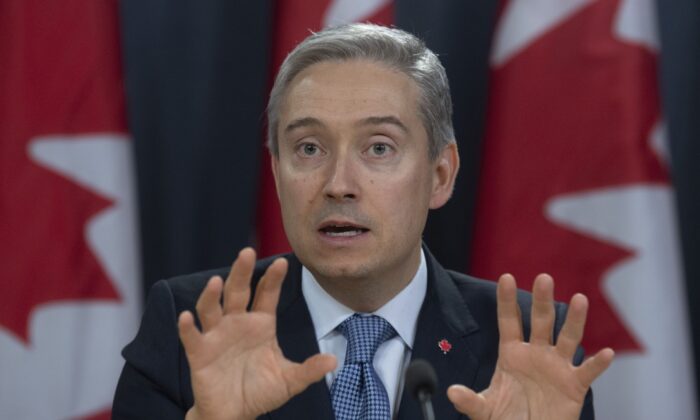FDA Bans 65 Chinese Mask Makers for Failing to Meet Filtration Standards
OTTAWA—Canada has backed an American−led effort to allow Taiwan to be granted observer status at the World Health Organization because of its early success in containing COVID−19.
Beijing says Taiwan is a Chinese province and should be under its rule, while pressuring other countries to not recognize the self-ruled island and preventing its membership at WHO.
Taiwan is also squarely in the centre of the Trump administration’s dispute with China and the WHO. The U.S. has temporarily halted funding to the organization over its allegedly inadequate assessment of COVID−19’s early threat when the novel coronavirus was breaking out in the Chinese city of Wuhan. U.S. President Donald Trump has criticized WHO for being “too China-centric.”
An Australian newspaper, the Sydney Morning Herald, first mentioned Canada as a country involved in the pro−Taiwan coalition, and Foreign Affairs Minister Francois−Philippe Champagne confirmed that when asked.
“Canada continues to support Taiwan’s meaningful participation in international multilateral fora where its presence provides important contributions to the public good,” Champagne said in an email to The Canadian Press.
“We believe that Taiwan’s role as a non−state observer in the World Health Assembly meetings is in the interest of the international health community and is important to the global fight against the COVID−19 pandemic.
“Canada encourages the WHO to engage with experts from Taiwan and to support Taiwan’s meaningful inclusion in global discussions on health.”
Canada approved a verbal demarche to two senior WHO executives during a meeting Thursday that urged them to allow Taiwan to be admitted as an observer to an upcoming meeting because its input would be “meaningful and important.”
A senior government official, speaking on the condition of anonymity because of the sensitivity of the situation, said the demarche was issued jointly on Thursday by the Geneva−based ambassadors of Canada, Australia, France, Germany, New Zealand, Britain, Japan, and the U.S.—with the envoys from Washington and Tokyo taking the lead.
The World Health Assembly meets on May 18 in Geneva.
WHO
In Canada, a Geneva-based Canadian doctor has come under the spotlight amid the Taiwan−WHO issue: Dr. Bruce Aylward, the epidemiologist who led a team of WHO experts to China to study the COVID−19 outbreak in February.
Aylward has repeatedly turned down invitations to testify via video before the House of Commons health committee. Last month, the committee issued a summons for Aylward to testify—after he twice snubbed it—but it is only enforceable if he returns to Canada.
Conservative Leader Andrew Scheer has raised concerns about the accuracy of the WHO’s data on the pandemic, and China’s influence on the international body’s decisions.
Conservative committee member Matt Jeneroux, an Edmonton MP, has said he wants to be able to question Aylward about the effusive praise he has had for China’s virus−control efforts.
“In fact, the WHO has gone above and beyond to congratulate and thank China for their response which has been to mislead the world on the gravity of the virus,” Jeneroux told the committee last month.
Jeneroux said Taiwan has managed to “flatten the curve” of the virus but the WHO won’t acknowledge its accomplishments because it doesn’t want to anger China.
The Trudeau government has appeared reluctant to speak about Taiwan or wade into the U.S. dispute with the WHO and China. Champagne and Prime Minister Justin Trudeau have said that finger−pointing and lessons−learned exercises can come later, after the pandemic has been controlled.
But Trudeau praised Taiwan by name during his Friday briefing after a report that it had donated 500,000 surgical masks to Canada.
“I’m happy to thank Taiwan for its generous donation,” Trudeau said. “It is important at this point that Canadians and all people around the world pull together to be there for each other because this is a global challenge that is going to face a global response.”
Focus News: Canada Backs U.S.-Led Effort for Taiwan at WHO Over China’s Objections
China Needs to Develop More Nukes to Curb the US: Editor of Chinese State-Run Newspaper
